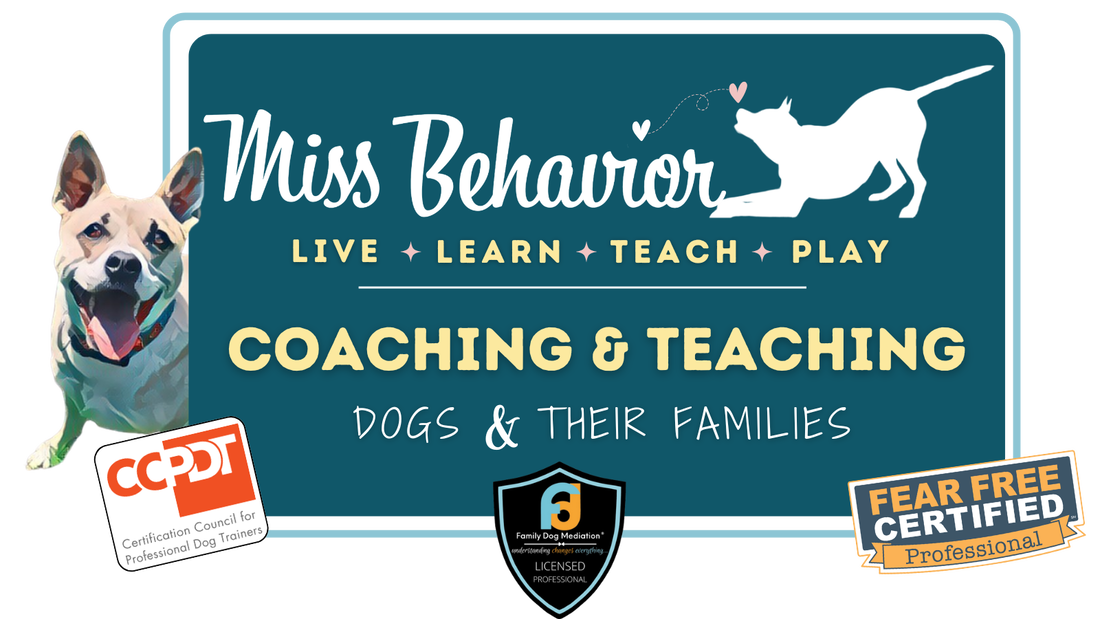The inside scoop on how to narrow down your trainer searchLooking for the right dog trainer and coach can be an intimidating challenge. It's important to discover someone who you can trust to support your dog and your family.
I've got you covered! I've put together some essential questions to ask prospective trainers and coaches that will give you an idea of whether you'll be a good fit for one another. You might be wondering why I, as a trainer and coach, am sharing this with you. Because there is only so much time in the day and so many family and dogs I can help. I won't be the best match for everyone so I want to provide you with guidance on how to filter through all the options available out there. Additionally, I'll share some warning signs and red flags that could indicate it's time to keep searching for a better match. You can find even more red flags in my last blog post. At my core, I believe in helping you and your pup achieve a happy and deep relationship through finding the best support for you and your family!
0 Comments
FINDING A TRAINER & COACH FOR YOUR FAMILY AND DOG: A Round-Up of Tips from your fellow dog-loving community
Searching for the perfect trainer and coach for your dog can be a daunting task. But, by looking out for specific red flags and green flags on their website and social media, as well as in your communication with them, you can find a trainer that you and your family can feel good about. This guide about how to find a good trainer aims to provide you with a round-up of tips from professionals and your fellow dog moms and dads. 10/11/2023 0 Comments Heading down the Vet Prep PathPreparing your nervous pet for a visit to the vet can be a daunting and overwhelming task.
Sometimes it feels like an all or nothing situation. "Well, if my dog is never going to love the Vet, we should just get it over with".
With a bit of understanding and some home-taught skills, you can make the next Vet visit a little happier. You'll turn this potentially stressful situation into a smoother and more comfortable experience for both you and your pup. Here is a overview to help you understand how I recommend navigating down the Vet Prep Path. 3 Stages of Success for Exercising your DogDoes your dog leave the house wired for a walk? Or maybe when he comes home, he's a little extra revved up and struggles to regulate his emotions? He might run the zoomies immediately AFTER he gets home. He might get mouthy, picking on you or his housemates, get destructive with toys or beds, jump and attention seek like crazy? You are not alone!
Punishment Based Training - Is it worth the risk?There are many reasons why I choose positive training methods.
In my opinion, there is far too much risk associated with punishment-based/coercive/aversive methods. I am not here to judge choices. I am here to teach. To learn. To grow. And to follow my own personal principles. Look, punishment based methods wouldn't be around if they didn't work. When they do work, there is a lot of reinforcement for the one who applied it, so they stick. The animal listened and isn't that the ultimate goal? Maybe I am here today to tell you about the risks that I often see around training methods that include physical corrections, alpha rolls, verbal corrections, prong collar corrections, coercion, and the like. 3/2/2022 0 Comments The Power of Trick TrainingImproved attention, a better relationship, and a bigger vocabulary for your dog.
What other type of training can do all that? 10/26/2021 2 Comments There are no blank slatesIf we want to live with our dogs successfully, we can't ignore the gene pool. The truth is - no puppy is born as a clean slate. There are thousands of years of reinforcement history in their genes. Looking at genetics is just as important as looking at your dog's learning history, their environment, health, age, etc. Inspired by Kim Brophey's LEGS model in Meet Your Dog and her Family Dog Mediator Course, I would encourage you to spend some time getting to know your dog so you can set realistic expectations and stop trying to fight an uphill battle. Sometimes the best thing we can do for our dogs is get to know them as they are. If you aren't sure which of these groups your dog belongs to, I would encourage you to head over to The Dog Key to enter your breed or take the quiz to help narrow it down!
How you talk to your dog makes all the difference in how he is likely to respond to youDuring a private training session the other day, I was asked a great question! As my client's husband was calling his dog over and had repeated "come" a few times in a row, she asked: "Aren't you supposed to only say the cue once?" This time, I saved her husband. What he did was actually exactly what I would do, mostly... I'll explain But first, let me ask you this: When you call your dog over to you, is your tone high or low? Do you say it once or repeat it over and over again? When you tell your dog to STAY, how is your tone then? How about LEAVE IT? How about when you ask your dog if he "Wants to go for a ride?" Think about how different your tone might be in all those different situations. What if you see a loose dog up ahead and you know it's not going to go well if that dog comes running over to your dog - might there be a change in your tone then, too? I think that's reasonable! But... Did you know that tone makes a huge difference in HOW our dogs respond to us? Ok, maybe you did but I would guess that you might still be underestimating the significance of it.
Dominance is not a dog's identity.Before you can understand how that can be true, it’s important to understand what dominance is and what it is not, especially as it applies to our dogs.
Here are the stages that will help set your training progress up for successWhen you are dealing with big emotions in dogs, it's important to break down the training process into smaller achievable goals that set everyone up for success.
Reactivity is simply responsiveness to a stressor, trigger, or something exciting in the environment. It can be really difficult for them to think or learn when they are in that state of mind, just as it can be hard for you to take in new information when you're in the same state of mind. When we expect too much from our dogs too soon, it can really set back our training progress leaving both ourselves and our dogs very frustrated and feeling defeated. For that reason, I'm going to show you the 6 stages to focus on to help find your success path in the training process |
|
- Home
- About
- Blog
- Services
- Membership
-
Courses & Freebies
- All Courses
- FREE Boredom Buster Recipes
- COURSE: Building Resilience in your Family Dog
- COURSE: Managing the Leash Walk
- Potty Training COURSE
- Paws Off COURSE
- COURSE: Managing the Leash Walk
- FREE Attention Building Challenge
- FREE Scratchboard Training
- FREE Rest and Recovery Round-Up
- FREE Body Language 101
- Contact
- Home
- About
- Blog
- Services
- Membership
-
Courses & Freebies
- All Courses
- FREE Boredom Buster Recipes
- COURSE: Building Resilience in your Family Dog
- COURSE: Managing the Leash Walk
- Potty Training COURSE
- Paws Off COURSE
- COURSE: Managing the Leash Walk
- FREE Attention Building Challenge
- FREE Scratchboard Training
- FREE Rest and Recovery Round-Up
- FREE Body Language 101
- Contact
Search by typing & pressing enter












 RSS Feed
RSS Feed





